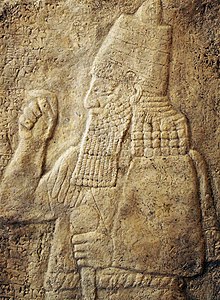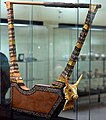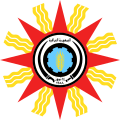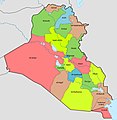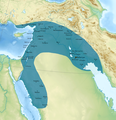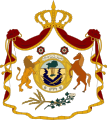
Back بوابة:العراق Arabic প্রবেশদ্বার:ইরাক Bengali/Bangla دەروازە:عێراق CKB Portal:Irak Spanish Portail:Irak French Portal:Iraq Malay Portal:Iraque Portuguese Портал:Ирак Russian Portal:Irak Turkish باب:عراق Urdu
The Iraq PortalA view of Baghdad, Iraq
Iraq, officially the Republic of Iraq, is a country in West Asia and in the geopolitical region known as the Middle East. With a population of over 46 million, it is the 30th-most populous country. It is a federal parliamentary republic that consists of 18 governorates. Iraq is bordered by Turkey to the north, Iran to the east, the Persian Gulf and Kuwait to the southeast, Saudi Arabia to the south, Jordan to the southwest, and Syria to the west. The capital and largest city is Baghdad. Iraqi people are diverse; mostly Arabs, as well as Kurds, Turkmen, Assyrians, Armenians, Yazidis, Mandaeans, Persians and Shabakis with similarly diverse geography and wildlife. Most Iraqis are Muslims – minority faiths include Christianity, Yazidism, Mandaeism, Yarsanism and Zoroastrianism. The official languages of Iraq are Arabic and Kurdish; others also recognized in specific regions are Turkish, Suret, and Armenian. Modern Iraq dates back to 1920, when a Mandate was established, followed by a British-backed monarchy under Faisal. The Hashemite Kingdom declared its independence in 1932. A revolution led by General Qasim, overthrew the monarchy and declared a republican Iraq and later ruled by brothers Abdul Salam Arif and Abdul Rahman Arif. The Ba'athist government took control, first led by Ahmed Hassan al-Bakr and then by Saddam Hussein from 1968 to 2003. Throughout the period, Iraq fought the Iran–Iraq War and the Gulf War. In 2003, a U.S.-led coalition force invaded and occupied Iraq and inititated a war, which overthrew Saddam's government. The war continued with an insurgency and sectarian civil war. The U.S. troops began to withdraw and war officially ended in 2011. The subsequent continuing repression and sectarian policies of Nouri al-Maliki's government caused protests, after which a coalition of Ba'athist and Sunni militias took up arms during a campaign. The climax of the campaign was the offensive by the ISIS that marked its rapid territorial expansion, prompting the return of American troops to fight the war, which lasted until 2017. Iran has also intervened since 2014, expanding its influence through sectarian parties and Khomeinist militia groups, triggering widespread protests. Post-war conflicts continues today (Full article...) Selected article - Al-Sidara (Arabic: السدارة), also known as the Iraqi Sidara (Arabic: السدارة العراقية) or al-Faisaliyya (Arabic: الفيصلية), is a cap that can be folded flat when not being worn. The hat was introduced by King Faisal I of Iraq shortly after gaining independence from the United Kingdom, with the intention to create a national dress for the head and to distinguish the people of Iraq from neighboring countries, most notably the Ottomans, who wore the Fez, and Arabs of the Arabian Peninsula, who wore the thawb. While the headwear's usage declined after the fall of the monarchy, the cap is still worn during special occasions and weddings. The headwear has also helped to distinguished Iraqis from other Middle Easterners and its introduction into Iraqi society by King Faisal I was regarded as one of the factors that created the modern Iraqi state. it comes in various colors, most commonly black. (Full article...)Selected picture
Shanidar Cave, where the remains of eight adults and two infant Neanderthals were found Did you know...
Selected biography -Sennacherib (Neo-Assyrian Akkadian: 𒀭𒌍𒉽𒈨𒌍𒋢, romanized: Sîn-ahhī-erība or Sîn-aḥḥē-erība, meaning "Sîn has replaced the brothers") was the king of the Neo-Assyrian Empire from the death of his father Sargon II in 705 BC to his own death in 681 BC. The second king of the Sargonid dynasty, Sennacherib is one of the most famous Assyrian kings for the role he plays in the Hebrew Bible, which describes his campaign in the Levant. Other events of his reign include his destruction of the city of Babylon in 689 BC and his renovation and expansion of the last great Assyrian capital, Nineveh. Although Sennacherib was one of the most powerful and wide-ranging Assyrian kings, he faced considerable difficulty in controlling Babylonia, which formed the southern portion of his empire. Many of Sennacherib's Babylonian troubles stemmed from the Chaldean tribal chief Marduk-apla-iddina II, who had been Babylon's king until Sennacherib's father defeated him. Shortly after Sennacherib inherited the throne in 705 BC, Marduk-apla-iddina retook Babylon and allied with the Elamites. Though Sennacherib reclaimed the south in 700 BC, Marduk-apla-iddina continued to trouble him, probably instigating Assyrian vassals in the Levant to rebel, leading to the Levantine War of 701 BC, and himself warring against Bel-ibni, Sennacherib's vassal king in Babylonia. (Full article...)
General imagesThe following are images from various Iraq-related articles on Wikipedia.
ListsTopicsCategoriesRelated portalsReligions in Iraq Arab states Other countries WikiProjectsThings you can do
Associated WikimediaThe following Wikimedia Foundation sister projects provide more on this subject:
Discover Wikipedia using portals | ||||||||
© MMXXIII Rich X Search. We shall prevail. All rights reserved. Rich X Search




